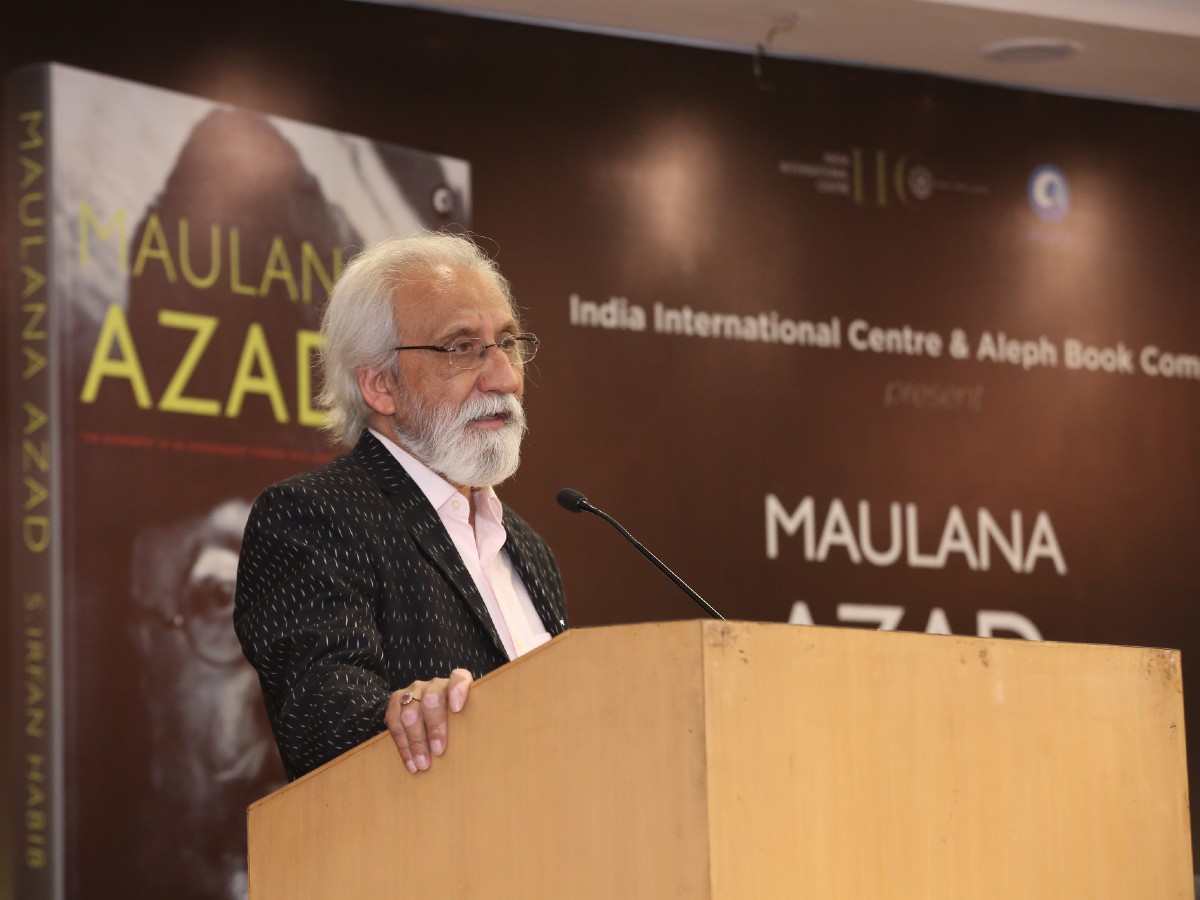
Author S Irfan Habib addressing the audience at the book launch
A prolific writer and academic, S Irfan Habib is a rare historian who writes for the masses. Even as people are still eager to lay their hands on his book Inquilaab, a book on Bhagat Singh’s views on religion and revolution, Habib has come up with a biography of Maulana Abul Kalam Azad, independent India’s first Union education minister who started many socio-cultural organisations and set up the University Grants Commission.
The book ‘Maulana Azad: A Life’ was released at a packed auditorium in the India International Centre recently. Former Vice President Hamid Ansari and noted historian Romila Thapar were among the dignitaries who attended the launch. Thapar called Azad “an educated education minister”. Habib refrained from saying much at the launch, preferring his readers to form their opinion after reading the book. “Maulana Azad remains more relevant today than ever before,” he said before taking a few questions from Patriot. Excerpts:
Q. Is this book on Maulana Azad a deliberate attempt to bring one of the founders of modern India back into the public discourse?
A. Yes, it is a conscious attempt to bring Maulana and his ideas back into circulation. In any case, we have not discussed him much, though some interesting and insightful books have been written on the subject. He is more relevant today because we need his ideas to understand Islam afresh. We also need him to comprehend the idea of India he left behind, which is under severe strain.
Q. Maulana Azad’s entry into the freedom movement changed the perspective of many revolutionary leaders, most of whom used to think of Muslims as being close to the British. Could you elaborate?
A. Maulana Azad entered the freedom struggle in 1920 when he was released from exile after three years. The main task or challenge before Azad was to bring many Muslims into the Congress’ fold. He could see that many of them were still skeptical of the Congress, particularly in the light of misleading campaigns by the Muslim League. Maulana had begun his fight against British imperialism through his fiery writings in Al-Hilal and Al-Balagh. His entry into Congress did make a huge difference. He was aided in this effort by the support of Darul Uloom, Deoband and several other Muslim organisations, particularly the pasmandas.
Q. Maulana Azad’s speech from Jama Masjid at the time of Independence is often talked about. Do you think Muslims would have been better advised to listen to him?
A. Maulana Azad delivered that historic speech, which was laced with an emotional appeal to Muslims not to be swayed by the communal logic of the Muslim League and to stay back in India, a country of their forefathers. However, the communal polarisation of the previous few years was being used to justify the choice of those who left for Pakistan. Still, I believe, given the plight of Pakistan today and particularly of the muhajirs [who migrated from North India to Pakistan after the partition] that Maulana’s appeal should have been heeded by a larger number of Muslims.
Q. Maulana Azad stood for universal compulsory education up to 14 years of age. How far have we been able to realise his dream?
A. Maulana was conscious of the stark realities of India. He realised early that India had been a society where a large section of Indians was denied access to education. He also felt that a majority of Indians are economically impoverished and could not access education without state support. He committed himself to free and compulsory education till the age of fourteen, while also stressing upon the education of adults, which was equally crucial. In a democracy, educated adults are necessary to make a sane choice in the use of the franchise. However, it took several decades to reach the Right to Education Act, though the implementation is still problematic.
Q. Finally, has Maulana Azad been given credit due to someone of his stature by the governments at the Centre?
A. He was an important figure in Congress and held a place of respect in the first independent government. He was also awarded Bharat Ratna, the highest civilian honour, but, like so many other luminaries of our freedom struggle, he and his vision have been forgotten by successive governments. I hope we care to remember him now when his ideas can be of immense help.
On the principle of 'Sarvajan Hitaya, Sarvajan Sukhaya' -- Welfare for all, Happiness for all…
With hundreds reported missing in Delhi this year, this guide explains how families can use…
The case came to light after a 35-year-old woman from Panipat alleged that she had…
During the investigation, CCTV footage helped identify the suspects, according to Delhi Police
The launch took place during the inauguration of the Delhi Police Exhibition Hall at Connaught…
The 28-year-old factory owner was taken to Satyawadi Raja Harish Chandra Hospital in Delhi, while…